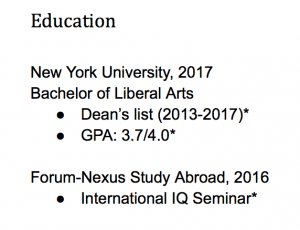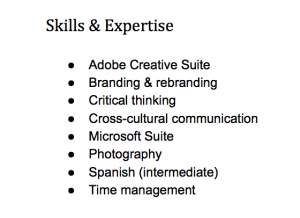So you’ve racked up more travel miles than days you’ve been alive. You’ve brushed up on language skills, explored paths less taken, dove head-first into a foreign culture, and lived one of the most meaningful chapters of your life- yet! BUT, if that invaluable study abroad experience is not on your resume, you’re selling yourself short.
This is a friendly PSA for all past, present, and future study abroad alumni: INCLUDE STUDY ABROAD ON YOUR RESUME!
Take it from a seasoned study abroad-er; there wasn’t a single internship or entry-level job interview where the conversation didn’t shift to my time spent abroad. They loved to hear about the “adventure” and used my recap to confirm skills and experience needed to be a great hire.
First, let’s break down WHY it’s important to add study abroad to your resume:
Studying abroad is an important form of education
Would you leave off your collegiate education on a resume? Of course not! Think of study abroad in the same regard. You financially invested into an highly educational opportunity, successfully completed the term, and are now applying the knowledge acquired in personal and professional ways. Helloooo qualified, educated individual.
It proves a strong skill set, especially in communication
We’re talking about buzzwords: cross-cultural communication, independence, adaptability, self-starter, critical thinking, time management, etc. For starters, being able to navigate and learn within a foreign country proves an ability to listen, communicate, and work with people from different cultures. Studying abroad is one of those rare opportunities where your entire skill set will expand for the better. Now is the time to show off those strengthened or newly learned skills! We’ll recommend how to include skills later on in this article.
Living abroad shows personal & professional development
On a personal level, uprooting your life to an unfamiliar country takes guts. It proves dedication in seeking out positive, personal acquisitions. It’s a nod to maturity in further learning who you are. On a professional level, you spend x amount of time learning in a culturally rich setting with peers from all over the world. It’s one of the best crash courses in professional networking for a college student. Remember what we said about studying abroad being a rare opportunity for expanding your skillset? The same applies to your own development.
The experience helps you stand out as a candidate
Whether you’re applying to graduate school, an internship, or your first job, there’s going to be plenty of other qualified candidates. Do yourself a favor and leverage relevant experiences and accomplishments, like studying abroad, so that your resume stands out. It is a unique detail that will make you easier to remember in a sea of applicants. A little competitive certainly edge never hurts!
Switching gears, here’s HOW to add your study abroad experience to your resume:
1) Under the “education” section of your CV/resume, add a bullet point to highlight your term abroad. Example:
 As shown above, the study abroad information should fall under the current/obtained degree from your home university. Think: main degree, additional forms of education.
As shown above, the study abroad information should fall under the current/obtained degree from your home university. Think: main degree, additional forms of education.
*Pro-tip: Feel free to bullet any prominent awards or achievements earned during either educational terms.
2) Remember those buzzwords from above? Make sure to have an area on your resume that’s dedicate to all relevant technical and best professional skills needed to land your next great endeavor. Example:  *Pro-tip: Always include specific skills you possesses, that are listed in job/internship/graduate school descriptions to align as closely as possible to the desired candidate.
*Pro-tip: Always include specific skills you possesses, that are listed in job/internship/graduate school descriptions to align as closely as possible to the desired candidate.
Whatever direction your resume or professional path takes, keep in mind: Living and learning abroad is a unique opportunity that not everyone is so fortunate to have. Maximize your investment!
Happy applying & keep traveling.